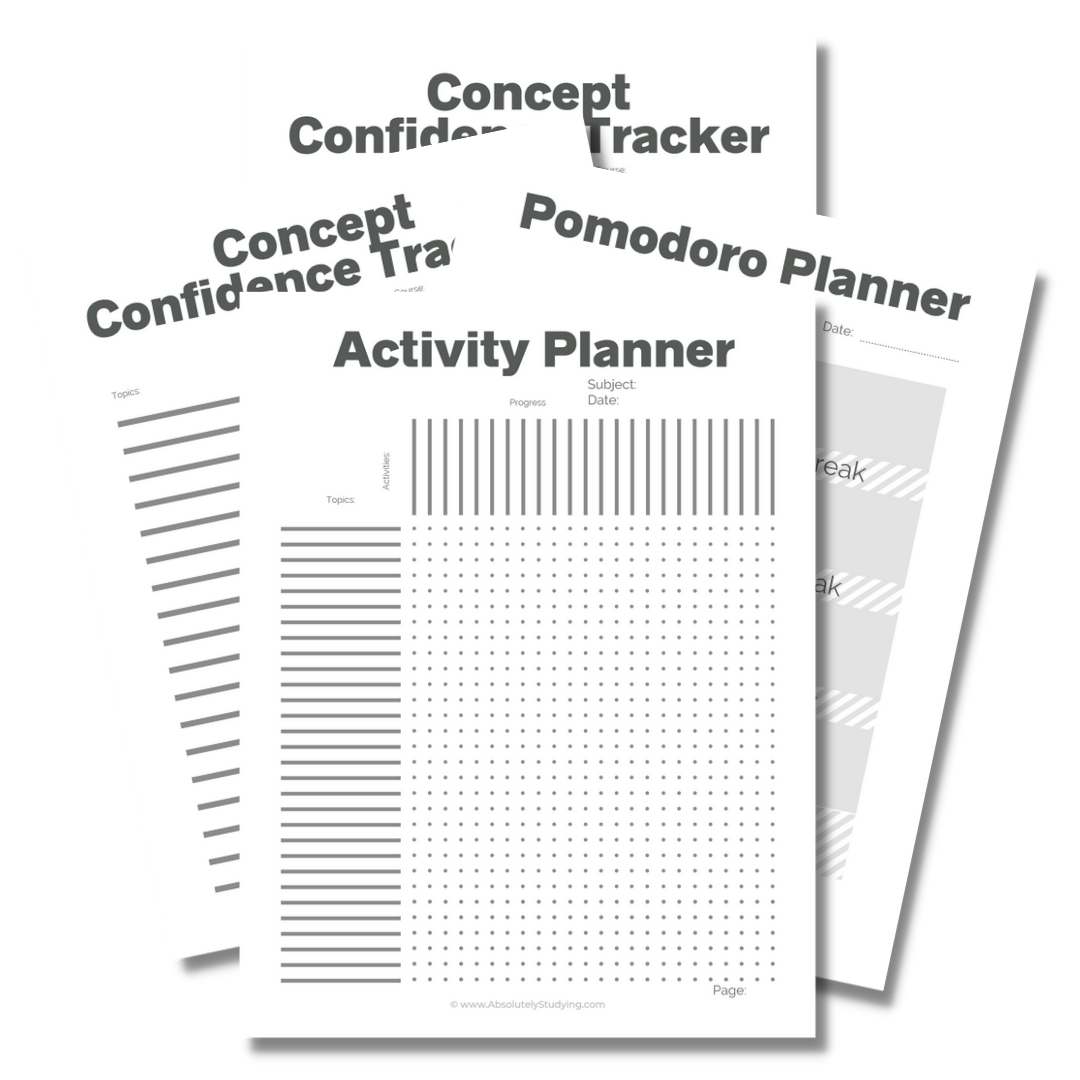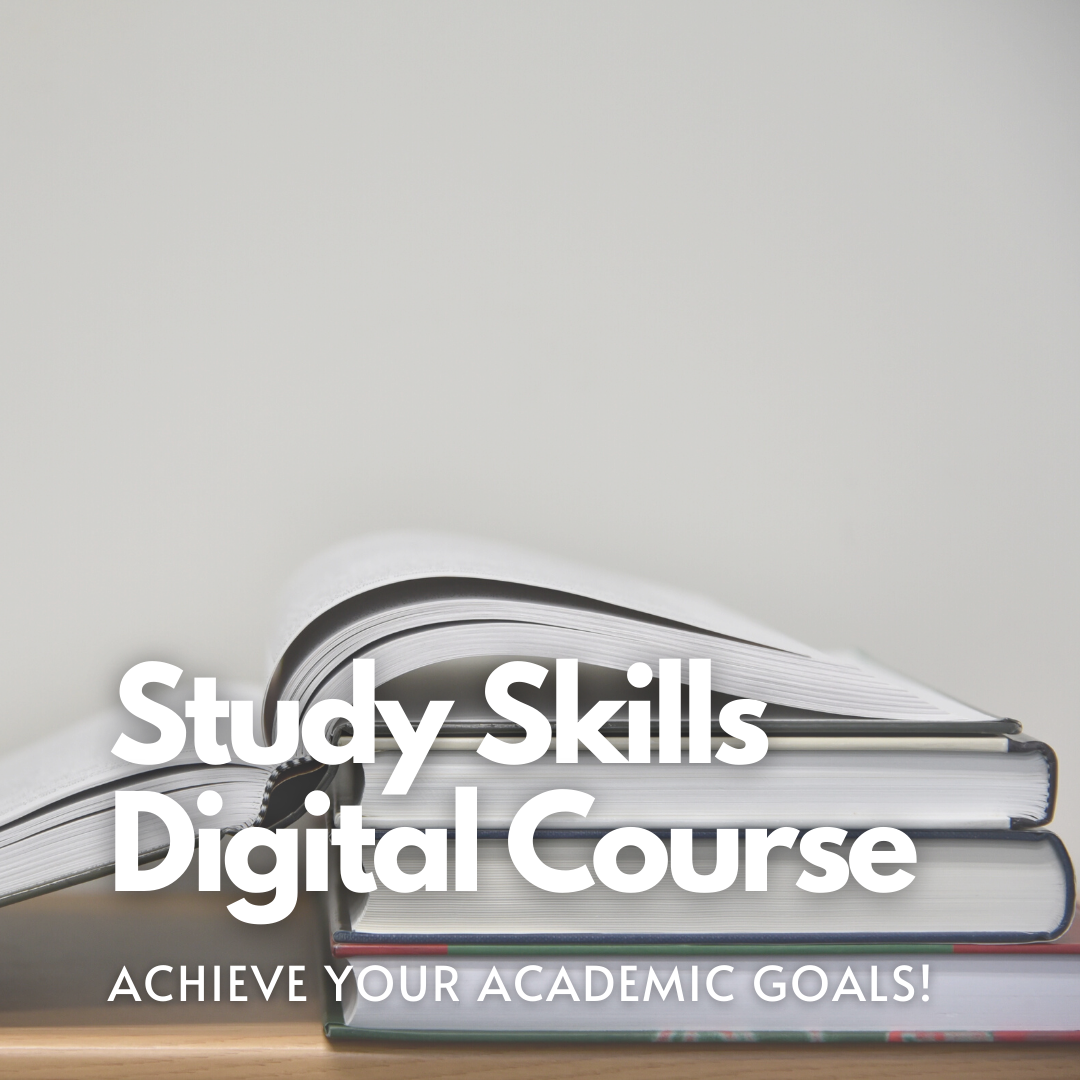10 Simple Methods for Improving Memory Retention That You Can Apply Right Now
10 Simple Methods for Improving Memory Retention
Study strategies that you can incorporate into your routine starting today!
Everything you need for the semester you want!
This bundle includes:
The Syllabus Study Planner
The Pomodoro Planner
A Confidence Tracker
A Q&A planner
The “Get Organized Checklist”
and more!
This workbook is full of super useful resources that can be applied to every aspect of your day.
* Disclaimer * Some of the posted links are affiliate programs. By clicking these links, I may receive monetary compensation. This will not alter the price or change the buyer's experience.
We are always looking for quick and easy ways to increase our memory. One of the most prevalent fears of post-secondary students is that one day their brains will just run out of space. If it does, how would you know? Will you receive a pop-up warning that your “brain space” is low? Or “critical error, back-up immediately.”
Do you think you would need to delete old memories to make new ones? Luckily, unlike our phones, our brain does not work that way. Our capacity to remember is virtually limitless as long as we are vigilant about how we treat our minds and the information. This, of course, is not considering disease or traumatic injury etc.
One of the biggest limiting factors to memory retention is focus. It’s hard to keep knowledge from fading away. Especially if you struggle with taking it up in the first place. The easiest way to combat this is by switching up how you study the information. Today we will discuss 10 simple methods for improving memory retention that you can apply right now. You can start incorporating these memorization strategies into your study sessions at once and watch the results on your academic performance.
What is Memory Retention?
Memory retention is the ability to learn new information and hold onto it for recall at a later time. In school, exams test how well you can retain and retrieve the information you learned in class.
Study strategies, such as spaced repetition, are essential for strong, long-term memory retention. This particular strategy employs the tactic of reviewing the material periodically to refresh your memory. You strengthen retention every time you revisit the material, holding onto it for longer.
When studying for memory retention, you can use nearly any study activity. The goal is to hold onto the memory and cement it in your brain. However, study strategies that use active recall will work double time. This technique helps you to retrieve the information much easier during test time.
Memory Retention and Academic Performance
Being able to remember core concepts is critical to your academic performance. Most classes in both college and university are graded mainly on exams. These test your ability to recall the information studied in class.
While you must remember these foundational concepts, you must also be able to apply them to various situations. Memory retention helps you remember how something works and link the information with associated topics and examples. These memory cues are vital to your academic performance.
10 Simple Methods for Improving Memory Retention That You Can Apply Right Now
Some study tips and tricks can help increase your memory and preserve the quality of the information stored. By using various methods to improve your memory retention, you will benefit by being able to remember more each time you review the information.
Mix and match these strategies throughout your study sessions. This will keep each study period fresh, which helps keep you engaged and focused on the material. These 10 simple methods for improving memory retention can be applied without extra steps or setup.
Using your study breaks to exercise floods your brain with oxygen and glucose.
A quick exercise session can help form new memories, according to a recent study. Try to fit in a quick cardio session before you start to study or, on your long Pomodoro break, to boost the effects of your study session. The extra blood pumping to your brain will flood it with oxygen and glucose, giving it everything it needs to work at optimal capacity.
Exercise will help wake you up and motivate you to be productive longer. According to that study, regular exercise can help recall and retrieve memories. This helps with learning and is a great reason to stay on it. You will need to keep these facts around and not only be able to retrieve them but to build on them over your entire post-secondary career. Knowing that a quick workout can substantially amplify your study efforts is a great reason to get in on some of this action.
You don’t need a gym membership to try a morning walk or a quick 15-minute cardio session. Maintaining these simple activities can help in many areas; it’s practically a gimme.
When I don’t feel like exercising, I will use my Pomodoro breaks to do physical chores. This could be anything from tidying off a kitchen counter to doing laundry. Something that has me up, out of my seat and moving around. These tasks will still get your blood pumping without committing to a single burpee.
Getting a good night’s sleep has an amazing effect on your memory.
It’s been proven, over and over again, that sleep is vital for processing and consolidating memory. You can often see the impact of a 15 or 20-minute nap immediately after a study session. Rest gives your brain the time it needs to discard nonessential information and reinforce pathways to the memories you want to keep.
After a long, hard study session, slip in a nap. It does not have to be a long one. 15 to 20 minutes is enough to give you a boost. This is a great reward, especially after hours of deep focus. It will help you with your memory retention by combining and filing all the new information and feeling refreshed and ready to take on your afternoon!
In addition to any naps you might try to sneak in, ensure you get 8 hours of sleep each night. It may be tempting to sleep in on weekends but maintaining a healthy sleep schedule, with consistent bed and wake-up times, will benefit both your memory and your overall health. It will also help you to not feel tired all the time.
Your diet can have a direct effect on your memory retention.
A healthy diet will give your brain everything it needs to optimize function. Eating lots of proteins, whole grains, and omega-3 fatty acids will help with healthy brain function, maximizing its ability to build and access memories. These are the building blocks your body needs to create and store these essential memories.
Diets high in fat and cholesterol have been shown to have a detrimental impact on memory. Try to limit the intake of these and instead try to choose a healthier option. That is not to say that you can never have a cheat day. Instead, make small, simple, healthy choices along the way.
Often the problem is time constraints or cost rather than just not wanting to make these healthier choices. With a little bit of research and some advanced planning, you can learn many ways to make simple choices that can create more access to these healthy options. Meal prepping helps with making these choices and keeping down growing grocery costs.
Focus and concentration significantly contribute to your ability to retain the information you study.
Studying is boring. But it is imperative to take in the information in the first place. Focus is essential here. You have to apply your full awareness to the information under study to truly take it in and memorize it.
Try switching up your activities every time you sit down to study. If you use the Pomodoro method, plan different activities for every block. This will keep your study time fresh, and you will not get into the rut of reading your textbook and writing out notes all night.
Changing up the activities can be fun, and for the periods that are not, they only last 25 minutes, then you are on to something new, so you can quickly push through. There is a Pomodoro session planner in my study guide template for you to try. It also has more than 20 study activities you can track throughout the semester. Download it for free and try planning out your study activities for the week.
Study Guide Template
Download your free study guide template. It has everything you need for the grades you want.
Staying organized will help save your energy for studying.
Organizing your life, from your desk to your schedule, will help you live with less clutter and frenzy. This will, in turn, relieve the chaos in your mind. When your mind is less cluttered, it’s easier to focus and pay attention to the study session at hand.
Getting organized also allows you to plan your study time to use it most effectively. This can translate into spending the time you need on the topics that need it rather than being all over the place in material and subjects. Use your planner or the Pomodoro templates to plan each study session. This will help you to save time by allowing you to get straight to work.
Planning out a study schedule with activities and a timeline to cover all issues will help you organize your days. Getting organized frees up brain space so you can use your memory on what is essential. This strategy ensures that you cover all concepts over the semester several times. It will also help you switch up how you study these topics so you can use various techniques.
Visualize the concepts as you study them.
As you go through the content under study, stop after every sentence and visualize what you are reading. Your study sessions do not have to be rushed. Take your time on each step and really absorb the material you are learning.
Learning is not a race. The better you understand a concept, the better you will be able to remember it. Having a deep understanding is more important than getting through the material. The better you understand it, the better you will be able to retain the information.
Can you picture it and how it works? Can you relate that picture to other connected topics? Can you imagine how it would function? Stopping and using this extra layer will help to imprint this into your memory. Now, this content is no longer just words on a page. You have added movement and meaning to it, which will help you understand the subject matter and retrieve it later.
Link each concept to the information you already know.
If you can apply the information under study to something in your everyday life, you will increase the chances of being able to retrieve that information when you need it most. Creating these mental associations helps with understanding and recall because of the extra memory cues you have applied to it. Grouping relevant, related information together creates an intricate web that multiplies the links to the data.
Being able to link concepts you are learning to ones you have a firm grasp on will also aid in answering questions on the exam. Drawing on examples of why or how two concepts are related is a great way to show your understanding.
Layer your senses to create deep-rooted memory cues.
Mental associations and memory cues can come from any sensations. Applying several of them and layering them over the information you need to remember can help you with recall. After you have visualized how something works, try drawing a diagram. Anything you smell or taste during your study session can also help with this.
All these extra prompts can work in your favour when you have to retrieve these pieces of information during exam time. A memory tied to a unique smell can also pull all the other associated memories, allowing you to remember all the material studied in that session.
Study Skills Digital Course
Learn how to create a stress-free, comprehensive strategy!
Study in a variety of locations to boost your memory retention.
Switching up your study location often can help with focus. Not only will each site you choose have a different ambiance, but it can also increase your focus. The sounds, smells, or tastes you experience in a specific location will help layer the senses we spoke about.
Everything you study in this session will be linked with a common thread, helping draw them all to the forefront together. Each piece of associated information will be more easily accessible because of these crosslinks. Pulling one of these topics to the forefront will make remembering and applying each related concept easier.
Studying in a new location often will also keep you alert because your surroundings will be unfamiliar. This alertness can assist in keeping you focused, helping you retain the information better. We are naturally more aware of our surroundings when they are different. You can harness this and use it as a tool to boost your focus during the study session.
Snacking or chewing gum can help you to retain and recall new information.
Chewing during your study sessions can help promote focus and memory. This is a great excuse to grab a snack or chew gum if you aren’t hungry. It’s also a great reason to bring a bite into an exam if allowed.
While the exact mechanics of why this works are not fully understood, there are some hypotheses. One opinion is that chewing may help to promote blood flow to the brain during these periods of concentration. This would likely have a direct impact on functions involving memory.
Chewing can also have a calming effect on some people, reducing anxiety, which is also beneficial for test time. These benefits combine to increase your overall test performance by making it easier to recall information and analyze it critically.
As you make your way through college and university, you will find that minor improvements, over time, will add up to the results you want. Post-secondary school is a marathon, not a sprint, and must be approached as such. Finding these tiny improvements and applying them to your study strategies will help your overall academic performance.
Memory retention is the foundation of learning. Taking in new information, and storing it, is critical to your academic journey. As you continue, these concepts are built upon repeatedly. So, what you learn today will still be relevant in all your future classes.
Creating strong mental associations that you can rely on will be invaluable, so you need a study plan that works for you. Don’t forget to pick up my study guide template. It has trackers and planners to create the study sessions that will propel you to the grade you want. Download it here.
I would like to be transparent so that there are no misunderstandings. As an affiliate, I may earn a small commission from any products linked in this post. This is not a sponsored post, and I was not asked to recommend these products. These are products that I genuinely love and want to share with my audience.







